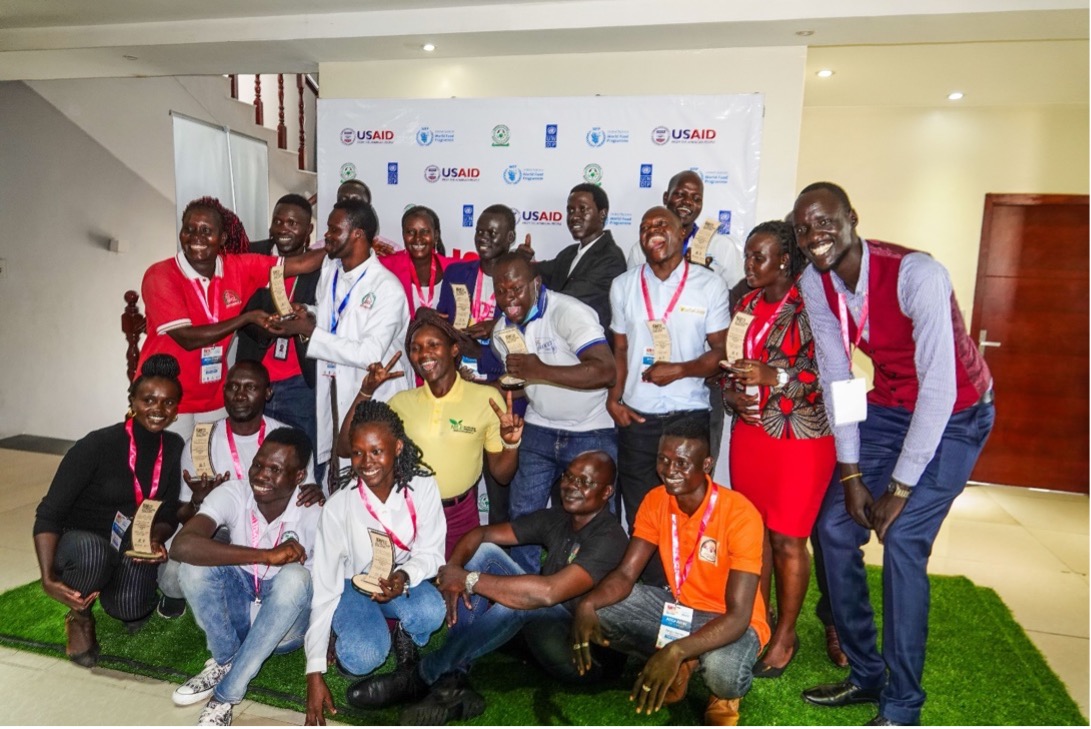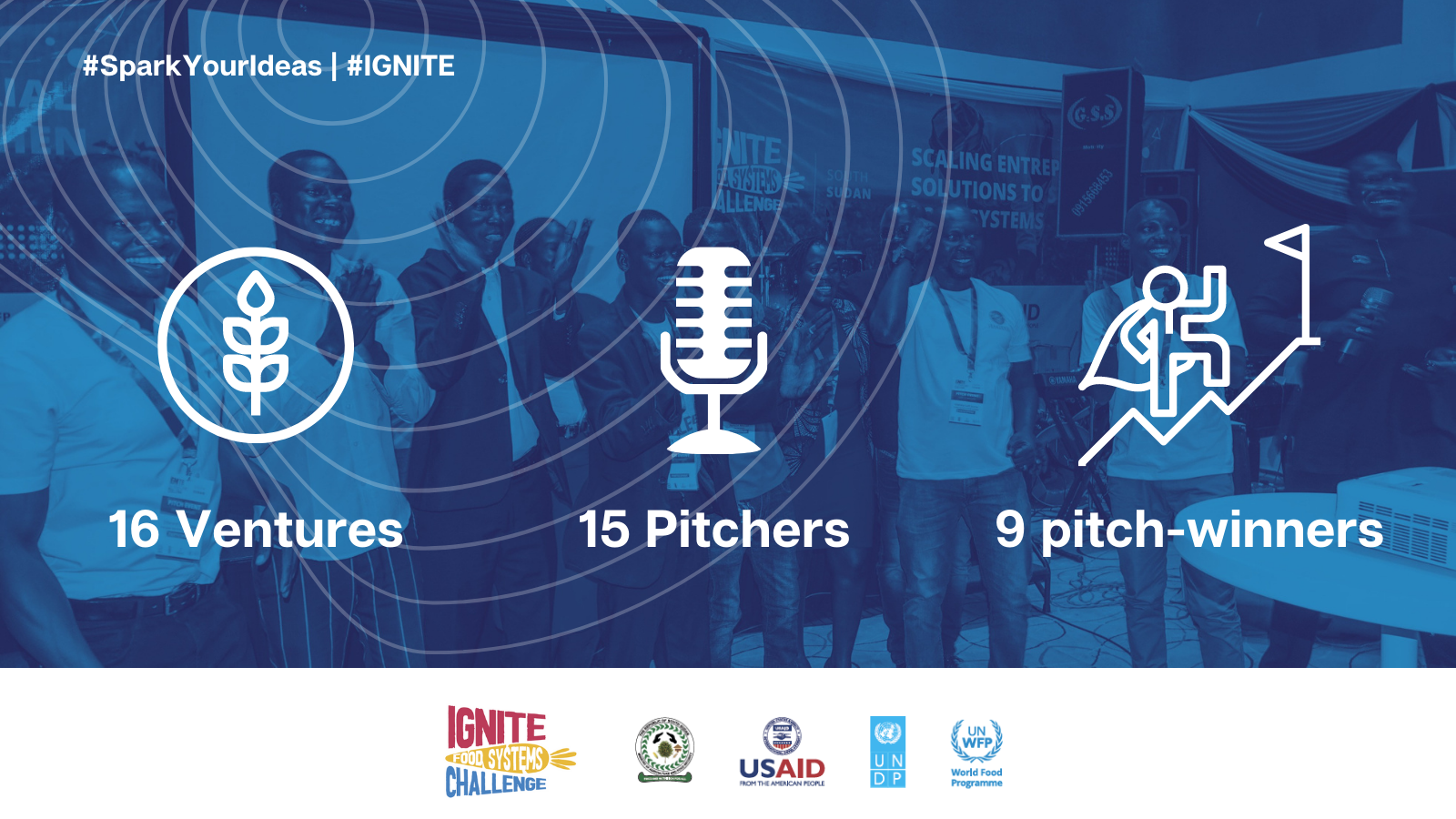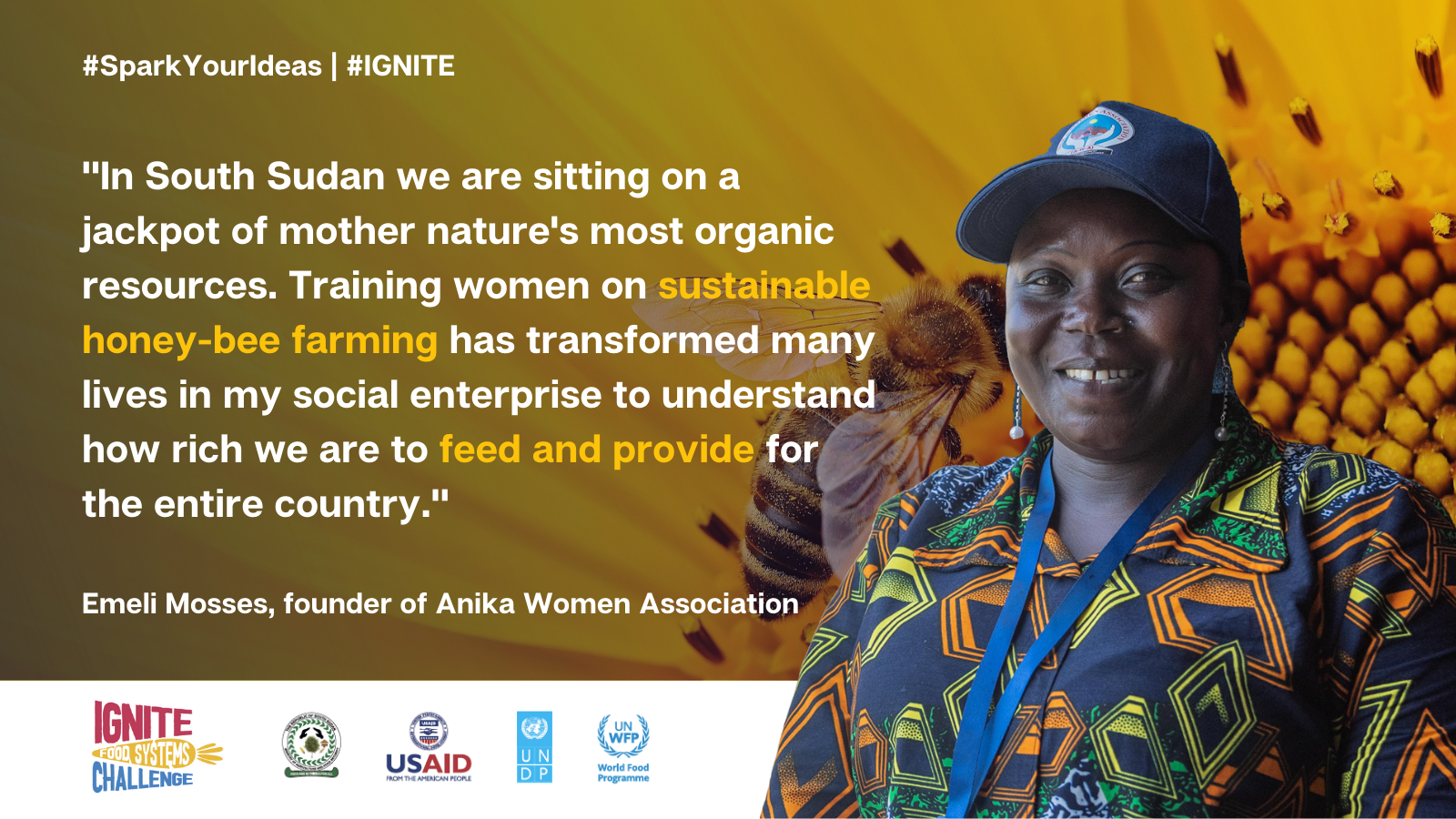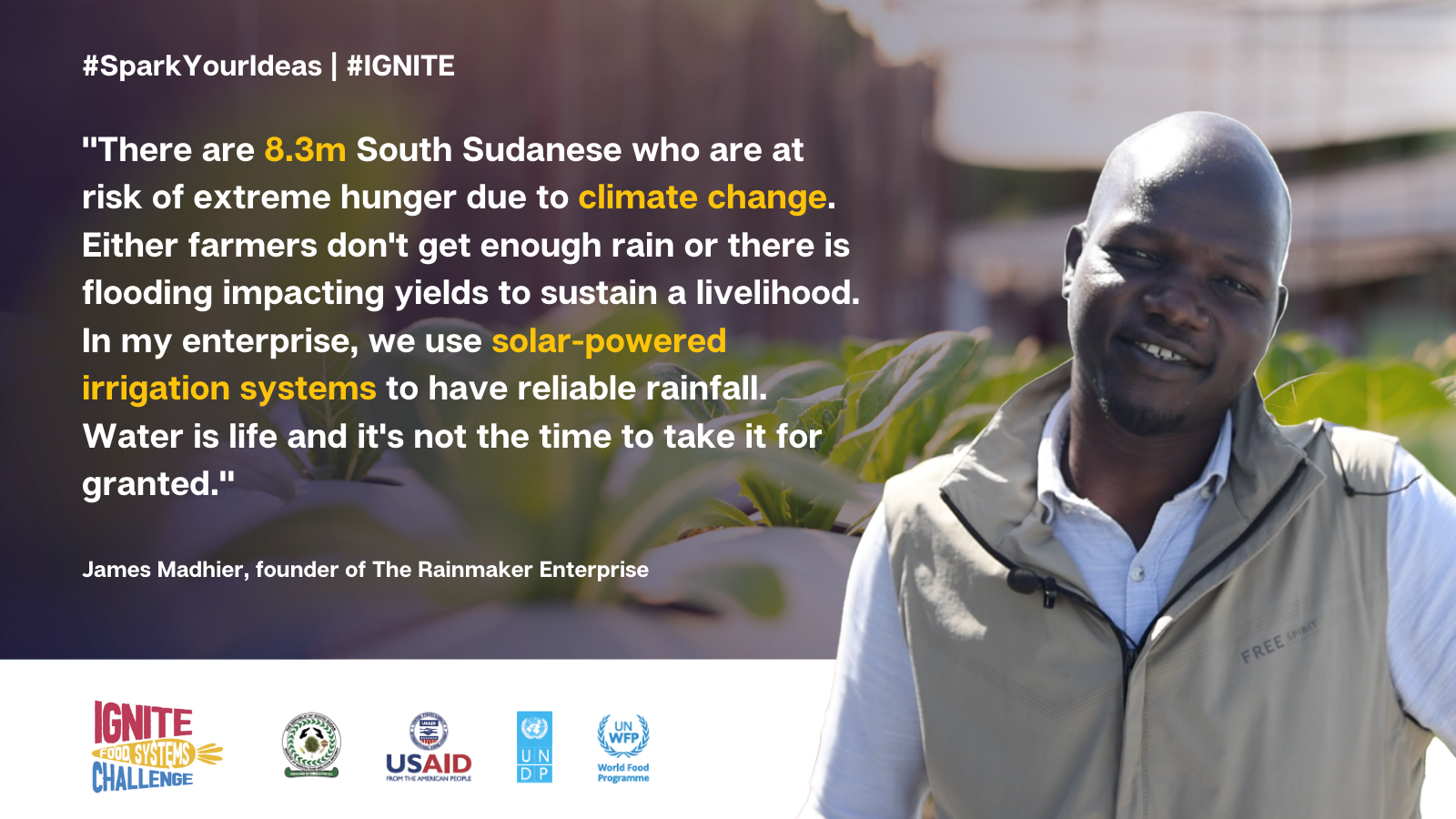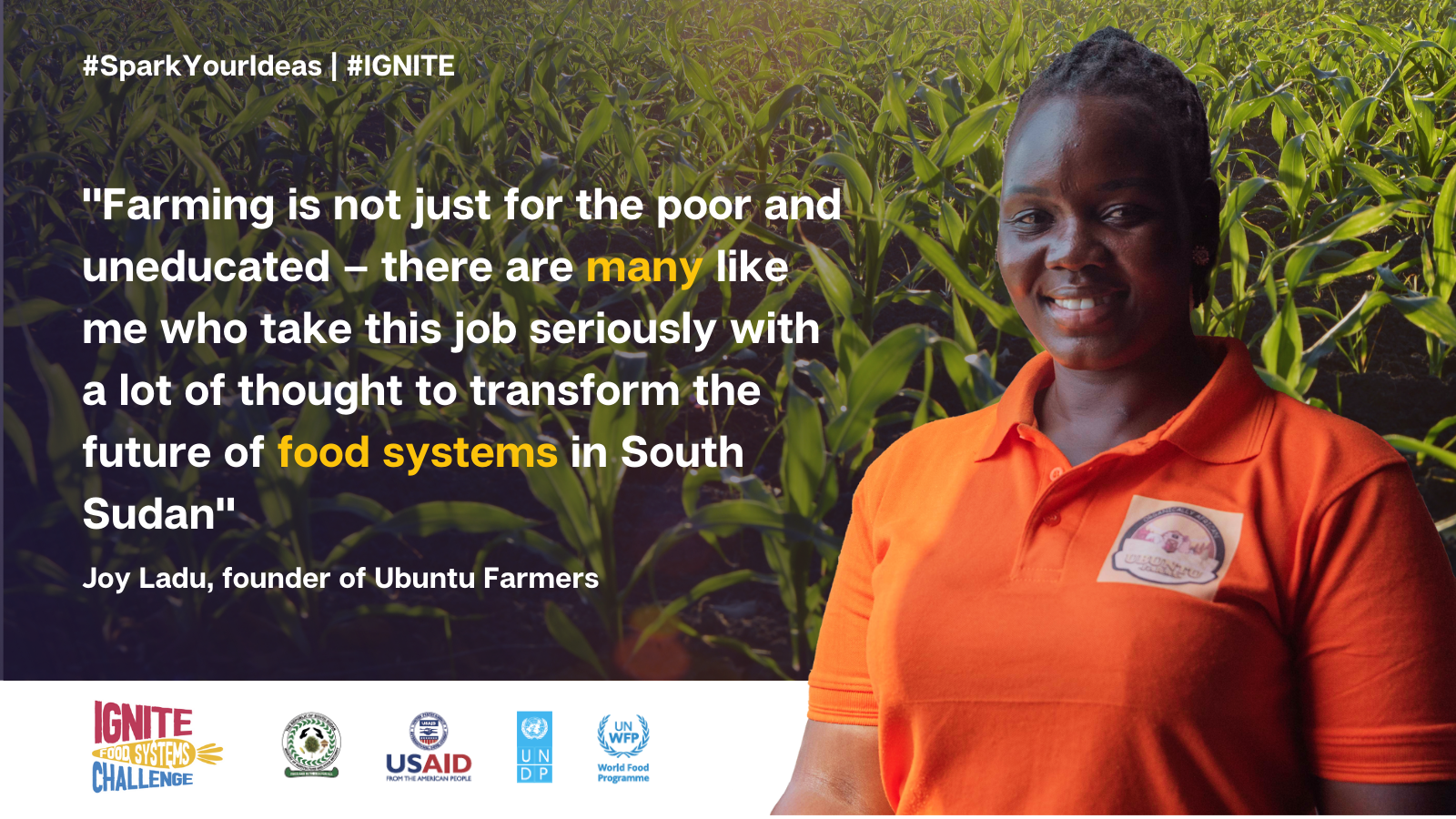The winning teams of the South Sudan IGNITE Foods Systems Challenge. Photo:UNDP\Amos Agiro
May 14, 2022, Juba
Last year in November, WFP and UNDP announced the IGNITE Food Systems Challenge to invite South Sudan’s most talented entrepreneurs to address the systematic challenge of famine and food insecurity. The joint-agency partnership identified entrepreneurial talent running small-to-medium agri-enterprises with the potential to up-scale for national impact.
South Sudan was one of three African countries to participate in the challenge and out of 255 applicants, 16 were selected to be part of a business incubation journey. In the next phase of the challenge, 9 participants were selected as finalist to receive pitch training to market and innovate their viable ventures to a judging panel. First place takes home USD$40,000 and the remaining eight candidates receive USD$20,000. Celebrated in a healthy competitive spirit, the IGNITE Food Systems Challenge in South Sudan also benefitted other entrepreneurs to be aware of potential collaboration with other agri-enterprises and innovators.
IGNITE process to date. Photo: UNDP
Climate change and protracted instability have heavily impacted South Sudan, resulting innovators to work in silos. Innovation platforms like IGNITE Food Systems is one of many solutions to sustain an entrepreneurial ecosystem to find solutions beyond food distribution for humanitarian relief. The participants are a testimony of many South Sudanese who rise to the occasion turning crisis into opportunity in the agriculture sector. Meet three participants below who are proud to showcase their #SouthSudanMade solutions to address famine and a shift towards sustainable consumption on food.
Emli Moses testimony. Photo: UNDP\Peter Kongmalavong
The secret is sharing knowledge for the next generation
Emeli Moses had an epiphany as a refugee in Uganda when she trained a group of youth to cultivate honey. Passed on from generation to generation, her honey-farm practices inspired youth in the refugee camp to be interest in expanding their own production into social enterprises. Moses' experience in Uganda was an impetus to start her own social-enterprise, Anika Women Association (AWA). In Western Equatoria Region, Moses has 7 employees to identify women who are economically vulnerable and trains them with agribusiness skills to generate income. Her social-enterprise also builds on sustainable agriculture practices from modern-bee keeping to organic shea butter refinery to mobilize communities near and far.
“What we noticed was a big drop of GBV in the community when we trained youth in modern-bee keeping. They were able to sustain a livelihood and co-exist to feel a sense of contribution to build a community. It was a means to an end that could help the community get out of poverty and understand the process behind food production,” says Emeli Moses.
Anika Women Association in Western Equatoria State refining nuts. Photo:\ Emeli Moses
Emeli teaching women honey farming and storing honey using hand-made honeycomb walls. Photo:\ Emeli Moses
Organic honey produced by Anika Women Association. Photo:\ Emeli Moses
James Madhier testimony. Photo: UNDP\Peter Kongmalavong
Invest in greening South Sudan for the future
James Madhier, also known as the Rainmaker has taken spiritual knowledge from his roots in rain dancing as a catalyst in his social enterprise installing solar powered water pumps. South Sudan has seen one of the worst droughts and floods in several decades. The extreme weather change impacts the human costs of small-holder farmers to sustain production and have a safety-net for earning an income. Madhier explains his concept of Rainmaker.
“Rainmaker comes from our traditional practices and spiritual leaders – in this case my grandfather– who would bless the crops before the farming season. When I was growing up, I would see communities coming together with their seeds and my grandfather would preside over the ceremony. The next day it rains, and people are happy planting their seeds and three months later they have a bounty harvest.”
Madhier’s childhood is the blueprint of this social enterprise to address the realities of climate change.
“As South Sudan faces climate change, this is no longer the reality. So, we introduced new technology to provide sustainable water that can be used for farming year-round as opposed to unreliable rainfall.”
Taking a community-led approach to design and install water pumps, James Madhier's sustainable approach employs farmers on modern agricultural techniques to regenerative farming practices. His enterprise supports small-hold farmers with seeds that are distributed to suppliers across South Sudan.
Water pump and Rainmaker technology in the field. Photo: James Madhier
Irrigation system for smallhold farmers in South Sudan by Rainmaker. Photo: James Madhier
Farmer showcasing potatoes using Rainmaker technology. Photo: James Madhier
Joy Ladu testimony. Photo: UNDP\Peter Kongmalavong
Destigmatizing farming
Joy Ladu, also known at the founder of Ubuntu Farm has been vocal on transforming the labour market in the agriculture sector. For South Sudan, the youth unemployment rate and gap to foster an entrepreneurship ecosystem is an approach Joy Ladu has taken to debunk the stereotype of farming in South Sudan. Her vision is to turn agribusiness on its head as a viable, intellectual and social transformative career.
“Farming should not be look at only for the poor and uneducated. You can be educated and a beautiful person and still do farming. I’m here to change the stereotype of farming and agriculture!”
South Sudan’s land is 70% fertile and has the potential to feed the Horn of Africa. However, instability has hampered sustainable agriculture production resulting in an inflation of imported goods. Ladu, has been able to train 81 South Sudanese by introducing backyard farming in small house-holds after the conflict to start their own agribusiness. In addition to the 81 trained, 17 outgrow farmer help cultivate, plant and manage farms and supply chains.
“For us to be a hunger free South Sudan, communities must be able to produce their own food… When I came back to Juba I realized that over 80% of our products are imported from our East African Neighbors in Uganda and Kenya. The cost of import is very high and it is not sufficient to feed the entire nation when in fact, South Sudan can cultivate most of the imported produce” says Ladu
Approximately 8.3 million South Sudanese are at risk to face hunger if no long-term sustainable food system to soften the costs of imported produce. The IGNITE Food Systems Challenges underpins the mindset to go beyond meeting immediate needs of humanitarian food relief to tackling the root and systemic causes of hunger.
“The Food systems Ignite Challenge has been a fantastic opportunity to find other entrepreneurs, ideas and innovators. We understand more about each other as South Sudanese trying to achieve zero hunger. We are not like our neighbor in Kenya or Uganda where financial support for entrepreneurs is there. And so this opportunity will empower and encourage more innovations in South Sudan” says Ladu.
Joy Ladu's female household farmers providing for a payam in South Sudan. Photo: Joy Ladu
Agriculture training to upscale organic production and harvest. Photo: Joy Ladu
Taking a venture accelerator model to find solutions in food insecurity
The Food Systems Ignite Challenge in South Sudan was designed as opportunity to invest in the potential of localized solutions to strengthen food systems. The phase of the project is carried out in 6 steps.
1. Call for applicants
2. Short listing
3. Skills training and due diligence
4. Pitch day
5. Incubation and acceleration
6. Evaluation and learning
The 9 pitching winners will now complete their journey with seed funding to test their proof of concepts in the field. Click here to read World Food Programme and UNDP’s joint press release on the IGNITE Food Systems Challenge pitch-day winners.
###
For more information contact:
Peter Kongmalavong, UNDP Communication and Multimedia Officer, peter.kongmalavong@undp.org
UNDP partners with people at all levels of society to help build nations that can withstand crisis and drive and sustain the kind of growth that improves the quality of life for everyone. On the ground in more than 170 countries and territories, we offer global perspective and local insight to help empower lives and build resilient nations.

 Locations
Locations